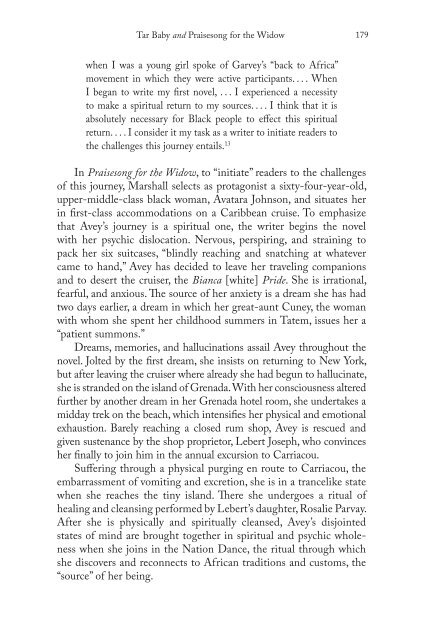Blooms Literary Themes - THE TRICKSTER.pdf - ymerleksi - home
Blooms Literary Themes - THE TRICKSTER.pdf - ymerleksi - home
Blooms Literary Themes - THE TRICKSTER.pdf - ymerleksi - home
Create successful ePaper yourself
Turn your PDF publications into a flip-book with our unique Google optimized e-Paper software.
Tar Baby and Praisesong for the Widow 179<br />
when I was a young girl spoke of Garvey’s “back to Africa”<br />
movement in which they were active participants. . . . When<br />
I began to write my fi rst novel, . . . I experienced a necessity<br />
to make a spiritual return to my sources. . . . I think that it is<br />
absolutely necessary for Black people to eff ect this spiritual<br />
return. . . . I consider it my task as a writer to initiate readers to<br />
the challenges this journey entails. 13<br />
In Praisesong for the Widow, to “initiate” readers to the challenges<br />
of this journey, Marshall selects as protagonist a sixty-four-year-old,<br />
upper-middle-class black woman, Avatara Johnson, and situates her<br />
in fi rst-class accommodations on a Caribbean cruise. To emphasize<br />
that Avey’s journey is a spiritual one, the writer begins the novel<br />
with her psychic dislocation. Nervous, perspiring, and straining to<br />
pack her six suitcases, “blindly reaching and snatching at whatever<br />
came to hand,” Avey has decided to leave her traveling companions<br />
and to desert the cruiser, the Bianca [white] Pride. She is irrational,<br />
fearful, and anxious. Th e source of her anxiety is a dream she has had<br />
two days earlier, a dream in which her great-aunt Cuney, the woman<br />
with whom she spent her childhood summers in Tatem, issues her a<br />
“patient summons.”<br />
Dreams, memories, and hallucinations assail Avey throughout the<br />
novel. Jolted by the fi rst dream, she insists on returning to New York,<br />
but after leaving the cruiser where already she had begun to hallucinate,<br />
she is stranded on the island of Grenada. With her consciousness altered<br />
further by another dream in her Grenada hotel room, she undertakes a<br />
midday trek on the beach, which intensifi es her physical and emotional<br />
exhaustion. Barely reaching a closed rum shop, Avey is rescued and<br />
given sustenance by the shop proprietor, Lebert Joseph, who convinces<br />
her fi nally to join him in the annual excursion to Carriacou.<br />
Suff ering through a physical purging en route to Carriacou, the<br />
embarrassment of vomiting and excretion, she is in a trancelike state<br />
when she reaches the tiny island. Th ere she undergoes a ritual of<br />
healing and cleansing performed by Lebert’s daughter, Rosalie Parvay.<br />
After she is physically and spiritually cleansed, Avey’s disjointed<br />
states of mind are brought together in spiritual and psychic wholeness<br />
when she joins in the Nation Dance, the ritual through which<br />
she discovers and reconnects to African traditions and customs, the<br />
“source” of her being.

















